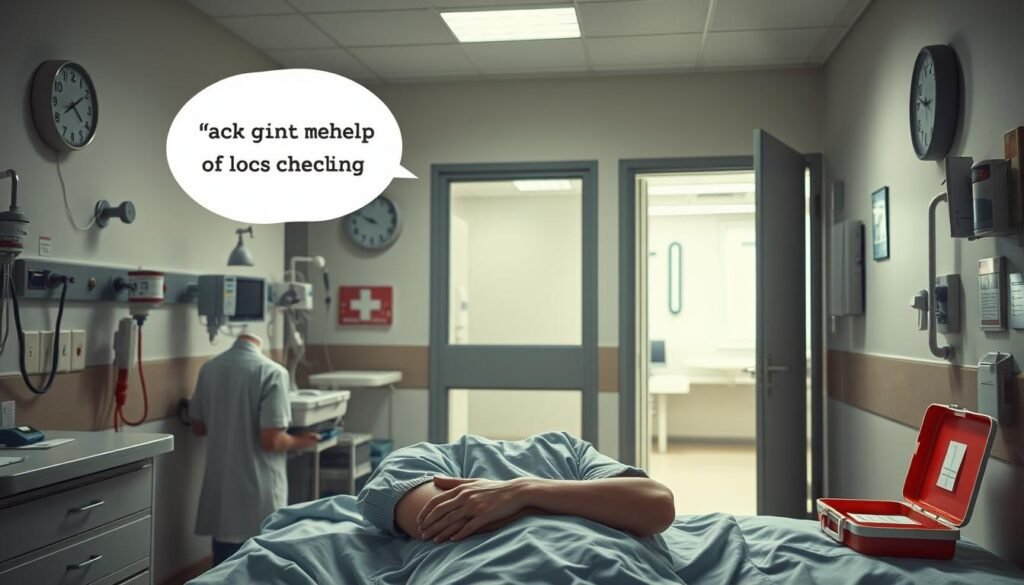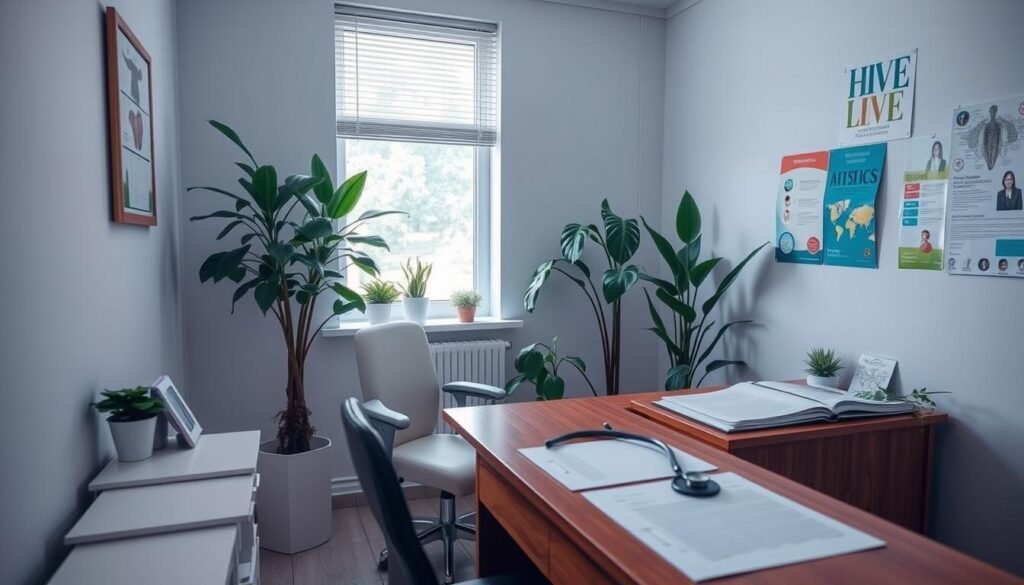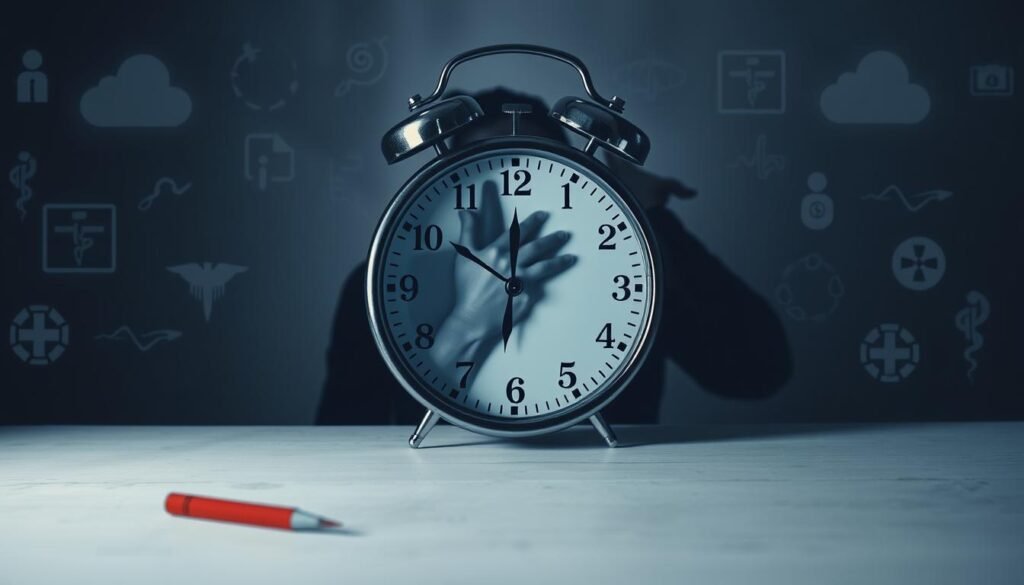Nearly 40% of adults ignore concerning symptoms and don’t seek medical help. This shows a big gap in health awareness. It could lead to serious problems. In our busy lives, knowing when to get medical care is key for health. This guide emphasizes how timely medical attention can change outcomes. It explains the difference between urgent and emergency care. This knowledge can save lives. Want to know when to get help? Check out this guide on seeking medical care.
Key Takeaways
- Recognizing symptoms early can prevent complications.
- Timely intervention is key to favorable health outcomes.
- Knowing the difference between urgent and emergency care is crucial.
- A significant percentage of adults overlook symptoms due to hesitancy.
- Planning for medical appointments and treatments involves understanding your health.
- You have rights to seek information and be informed about your care.
Understanding Your Health: The Importance of Timely Intervention
Understanding Health is about knowing when to get medical help. Many health issues get worse quickly if not treated, leading to serious problems or even death. The National Institute of Mental Health (NIMH) says that every year, one in five American adults suffers from a mental illness. This shows how crucial it is to get help right away.
Emergency mental health situations are common. Millions face these crises every year, says the National Alliance on Mental Illness (NAMI). Often, this leads to needing urgent care or hospital stays. Getting help quickly during these times can manage symptoms and help recovery. It can also lower the risk of harming oneself or others.
Regular visits to primary healthcare providers are key. They can catch illnesses early, which can save lives, especially with diseases like cancer or heart issues. Groups like Christian Healthcare Centers stress the importance of preventive care. They aim to build strong bonds between doctors and patients for early problem-solving.
Easy access to basic healthcare is essential for everyone. Quick help from medical experts helps control long-term illnesses and keeps communities healthier. A strong primary healthcare system is more affordable than specialized treatment. It also leads to better health for everyone.
| Healthcare Aspect | Benefits of Timely Intervention |
|---|---|
| Early Diagnosis | Lifesaving in conditions like cancer and heart disease. |
| Mental Health Support | Reduces risk of self-harm and promotes recovery. |
| Preventive Care | Helps manage chronic diseases effectively. |
| Cost-Effectiveness | Prevents costly treatments and emergency hospitalizations. |
| Community Health | Strengthens overall health outcomes for populations. |
Recognizing Symptoms: When to Take Action
Knowing when to seek help is key in getting the right medical care. It’s crucial to tell apart everyday symptoms from emergency ones. This know-how is vital for both kids and adults. Being quick to respond can truly make a difference.
Common Symptoms That Require Medical Evaluation
It’s key to know when to see a doctor for certain symptoms. These can be:
- Persistent headaches
- Abdominal pain that doesn’t go away
- Fever with tiredness
- Sudden mood or energy shifts
Experts say adults should seek help for chest pain that lasts, severe pain, or sudden dizzy spells and vision issues. For kids, look out for big mood changes, trouble breathing, seizures, and fevers with confusion. These signs should not be overlooked.
Signs That Indicate an Emergency
Certain symptoms demand quick action. Spotting these emergency signs can be life-saving. Watch for:
- Hard time breathing
- Intense chest pain
- Blackouts or confusion
- Stroke symptoms like weakness or trouble speaking
Quick action is essential for heart attacks and strokes. Call 911 immediately for these serious conditions. Stay calm and help the person stay stable until aid arrives.
| Condition | Common Symptoms | Emergency Signs |
|---|---|---|
| Heart Attack | Chest pain, nausea, feeling faint | Strong chest pain, trouble breathing |
| Stroke | Sudden weakness, intense headache | Stumbling, confused talking |
| Severe Allergic Reaction | Swelling, hives | Hard breathing, fast heartbeat |
| Respiratory Distress | Wheezing, chest feels tight | Lips or nails turning blue |
| Traumatic Injuries | Bad pain, obvious bleeding | Knocked out, broken bones |
Being alert to these symptoms lets you act fast for medical help. Always put safety first and treat emergencies with the seriousness they deserve.
When to Seek Medical Attention: Urgent vs. Emergency Care
Knowing when to choose urgent care or emergency care is key. Urgent care is for less severe health issues. It lets patients get help quickly without the long waits seen in emergency rooms.
Urgent care centers are open every day, with hours from 8 a.m. to 8 p.m. during the week. On weekends and holidays, they operate from 8 a.m. to 4 p.m. These centers are more affordable for treating mild to moderate problems, like coughs, sore throats, and infections. The cost is usually lower than an emergency room visit.
Emergency care is for serious, life-threatening issues. Think severe injuries, bad allergic reactions, strokes, or heart attacks. In such cases, quick access to special medical help is crucial. If the situation is dire, calling 911 is recommended by experts.
Emergency rooms serve many, especially older adults with particular health needs. They’re critical for urgent issues, like drug overdoses, which are sadly more common now. Emergency care acts fast in these situations.
| Criteria | Urgent Care | Emergency Care |
|---|---|---|
| Typical Wait Time | Shorter wait times | Longer wait times |
| Cost | Lower cost | Higher co-pay, often more expensive |
| Hours of Operation | 7 days a week, limited hours | Open 24/7 |
| Common Conditions Treated | Mild to moderate injuries and illnesses | Life-threatening conditions |
| Examples of Conditions | Cold symptoms, sore throat, ear infections | Heart attack, stroke, severe allergic reactions |
Both urgent and emergency care are key parts of healthcare. Knowing which to use helps people get the right treatment when they need it.
Evaluating Your Condition: Is It Serious?
It’s important to know how serious a medical condition is for the right treatment. Checking early can stop things from getting worse and ensure you get help on time. It’s key to ask certain questions to understand how severe your symptoms are. This helps in recognizing if it’s a Serious Illness or a Life-Threatening Situation.
Assessing Severity: Key Questions to Ask Yourself
To figure out your condition, asking the right questions is key. Think about these:
- Is it hard to breathe?
- Am I in a lot of pain?
- Am I showing signs of a bad allergic reaction, like hives or trouble swallowing?
- Do I feel very confused or keep passing out?
- Can I hardly stay awake or feel super weak?
These questions point out symptoms that may mean something serious or need quick medical help. Conditions like anaphylaxis or diabetic emergencies need fast action. They can get worse quickly. You can find out more on how to evaluate mental health and its effect on safety here.
Recognizing Life-Threatening Situations
Many situations need quick action because they could turn life-threatening fast. Knowing these is vital:
| Condition | Symptoms | Recommended Action |
|---|---|---|
| Anaphylaxis | Hard to breathe, throat swelling | Call 911 immediately |
| Heart Attack | Chest pain, sweating, short breath | Seek emergency care |
| Stroke | Face drooping, weak arm, speech issues | Act fast, call 911 |
| Severe Injury | Heavy bleeding, trauma | Go to the emergency room |
| Mental Health Crisis | Suicidal thoughts, hallucinations | Contact mental health services or emergency care |
If you’re unsure about your symptoms, going to the emergency room is often the safest choice. Waiting too long for help can end badly. It helps to know different conditions and their signs so you can act right. Being aware of what signs to look for makes checking on your condition easier.
Recognizing Worsening Conditions: Warning Signs to Watch For
It’s key to watch for worsening health signs, especially with chronic illness. Look out for new symptoms or changes in current ones. This could mean you need urgent care. Knowing these signs can help you get better treatment options.
Chronic Conditions and Acute Episodes
Those with chronic illnesses must watch for sudden, severe changes. Be aware of these symptoms:
- Unexplained weight loss
- Increased pain or discomfort
- Changes in mental status, such as confusion or disorientation
These signs could show your health getting worse. Acting quickly is vital. It helps avoid bigger problems linked to chronic illnesses.
Changes in Symptoms That Require Immediate Attention
Noticing symptoms changing is crucial. Keep an eye out for:
- Skin issues, like sores that won’t heal or new mole changes, might suggest skin cancer.
- Respiratory problems, like ongoing shortness of breath, could mean serious lung issues like COPD.
- Digestive issues, such as rectal bleeding or bowel habit changes, may point to major gastrointestinal problems.
- Mental health red flags, like constant worry or mood swings, can show emotional health declining.
Being aware of these symptoms is important. It helps you act fast. This can help manage chronic illnesses better and lower the risk of big health issues.
Emergency Care: Making the Right Decision
It’s important to know when to choose urgent care or emergency care. This decision can greatly affect health outcomes. Knowing when to call 911 is vital as it can save lives. Recognizing symptoms that need quick action helps with better health management.
Understanding When to Call 911
Some situations require calling 911 right away because they could be deadly. These include:
- Severe chest pain or discomfort
- Unconsciousness or unresponsiveness
- Severe bleeding that does not stop
- Breathing difficulties or choking
- Signs of a stroke, like sudden weakness or confusion
Acting fast in these cases ensures people get the emergency care they need quickly. This lets medical teams deal with serious conditions right away.
Choosing Between Urgent Care and Emergency Departments
If the situation isn’t life-threatening, deciding on urgent care might be best. Urgent care is for less serious problems like sprains, flu symptoms, and small cuts. They offer:
- Quick treatment without long waits
- Diagnostics, including X-rays and lab tests
- Extended hours to fit your schedule
Understanding the difference helps in making the right choice between urgent and emergency care. For more information about when to seek the right medical help, check out this resource.

Seeking Professional Help: Knowing Your Options
When you need medical help, knowing what’s available is key. Seeking Professional Help includes many paths, like seeing family doctors or specialists. It’s important to know the medical options available for your health needs.
Starting with a general practitioner is common. They are the first to consult for health concerns. They evaluate your condition and suggest next steps. For complex issues, specialists like heart or brain doctors offer detailed care. They bring deep knowledge that can change a patient’s health journey.
For quick needs, urgent care clinics are useful. They help with urgent, non-life-threatening issues and are open after hours. For serious emergencies, emergency departments are crucial. They provide immediate care for life-threatening conditions.
Talking well with your healthcare providers matters a lot. Asking questions can make your visit more useful. Having a relative or friend with you might help in understanding the advice given. This teamwork can improve health results.
In conclusion, knowing how to seek seeking professional help is key to managing health problems. Patients should feel okay looking into different medical options. They should work with healthcare providers to find the best treatment.
Consulting Doctors: How to Prepare for Your Visit
Preparing for a doctor’s visit is key to a good consultation. It helps you talk clearly, ask the right health questions, and make smart health choices. A well-planned visit means a better chance of getting the right diagnosis and treatment.
What to Bring to Your Appointment
Bringing the correct items to your appointment is vital. You should consider the following:
- List of current medications, including dosages and schedules.
- Medical history, including previous surgeries or ongoing treatments.
- Names and addresses of previous doctors to facilitate records transfer.
- Eyeglasses or hearing aids, if applicable, to ensure clear communication.
- Family member or friend for support and to help recall important discussions.
Questions to Ask Your Healthcare Provider
Asking questions is crucial for understanding your health. Here are some key questions to keep in mind:
- What is the purpose of the recommended tests or procedures?
- Can you explain the results of my tests and what they mean?
- What are the names and dosages of any new medications?
- Are there cheaper options for these medications?
- What lifestyle changes can help my condition?
Don’t be shy to ask for explanations on anything confusing. Good communication leads to better care.

Getting your thoughts and questions ready before seeing your doctor helps the talk go well. Knowing about your condition, needed tests, and the treatments helps you take control of your health.
Prioritizing Health: Preventive Measures and Care
Investing in our health before problems begin is key to staying well. Routine doctor visits help catch and manage health issues early. This lowers the chance of big health problems later. Preventive care includes health screenings and teaching us about keeping healthy.
Routine Check-Ups: Why They Matter
Regular doctor visits are a cornerstone of staying healthy. These check-ups screen for things like heart issues, diabetes, and some cancers. Following doctor’s advice can make us healthier. Sadly, only 8% of U.S. adults over 35 get the recommended preventive care. It’s crucial we make these health checks a priority.
- Screening types: These can include blood pressure checks, cholesterol levels, and cancer screenings.
- Importance of family history: Those with a family history of diseases may require more frequent screenings.
- Children’s health: Regular well-child visits include growth checks and vaccines, crucial for young kids.
The Role of Health Education in Preventing Emergencies
Health education teaches us about our health risks and how to avoid emergencies. Knowing when to get help is the first step. It covers important topics like spotting serious health signs and making healthy choices. Advice on quitting smoking, eating right, and taking care of our mental health is part of this.
Adding good health education to preventive care helps us take charge of our well-being. Talking with health experts gives us knowledge on when to get more tests if something’s wrong. This leads to better care over time.
Avoiding Complications: The Impact of Delayed Care
Putting off medical care can lead to serious problems, particularly if symptoms are ignored. Getting help early can prevent complications from untreated illnesses. Early detection, especially in cancer, makes treatment more effective. Screenings like mammograms help catch diseases early, improving chances of survival.
By June 2020, 41% of U.S. adults avoided medical visits due to COVID-19 fears. Doing this can make health issues worse. Heart disease sufferers face extra risks, as delays can cause heart attacks or strokes.
Infections need fast treatment to stop them from getting worse. Timely medical care is vital for preventing severe outcomes. Not delaying treatment is key, as ignoring mental health problems like depression can have serious effects.
Ignoring orthopedic issues can also make things worse, leading to conditions like arthritis that affect mobility. People with health conditions or in certain groups often delay care, leading to more health issues.
Delaying care can also raise future health costs due to needing more complex treatments. Therefore, valuing quick medical attention not only leads to better health but also saves on future health costs.

Conclusion
Understanding symptoms and knowing when it’s time to see a doctor is key to staying healthy. Many people skip getting help because it’s expensive or they don’t have insurance. However, being aware of health issues is more crucial now than ever. Being proactive helps people make smart choices. This can lead to getting help sooner, which prevents more serious problems.
Knowing the different medical services available is important. Whether it’s urgent care or emergency services, it’s about what you need for your health. It’s also proven that getting medical help fast leads to better health afterwards.
Staying informed and noticing when your health changes are powerful. It empowers you to get medical help when it’s needed. Talking about health issues helps everyone understand how to take care of themselves better. It makes the journey through healthcare easier for all.